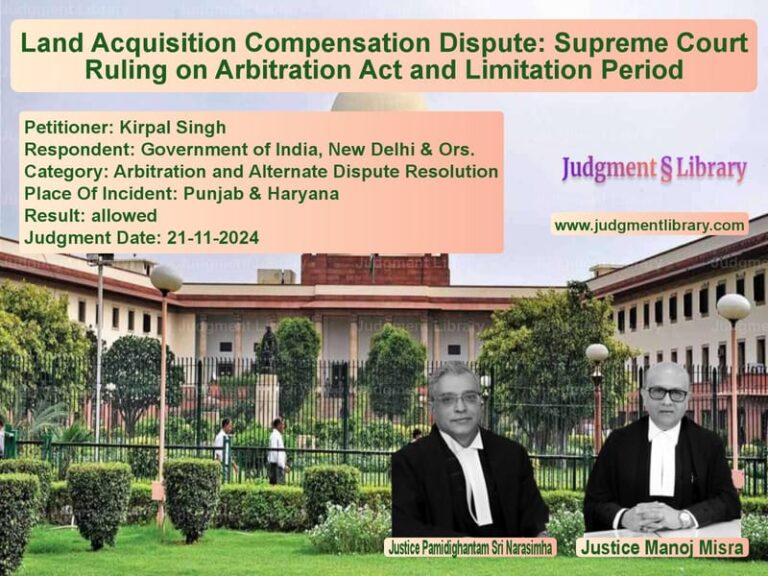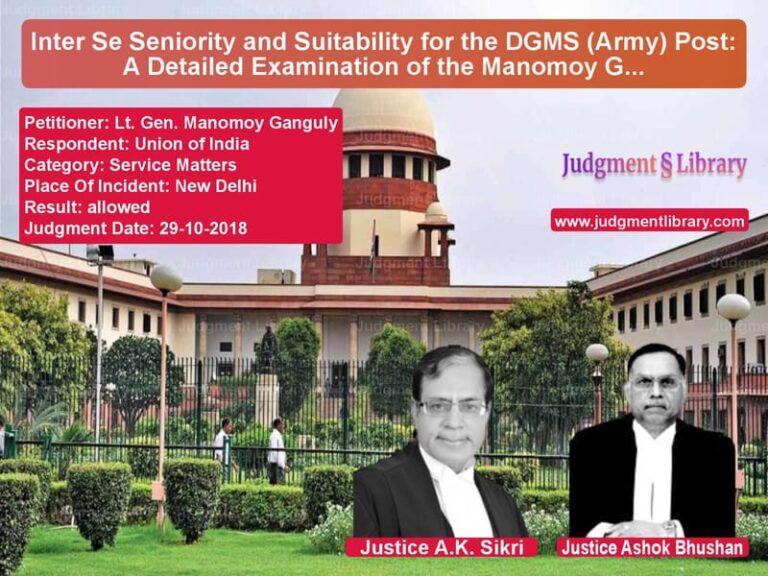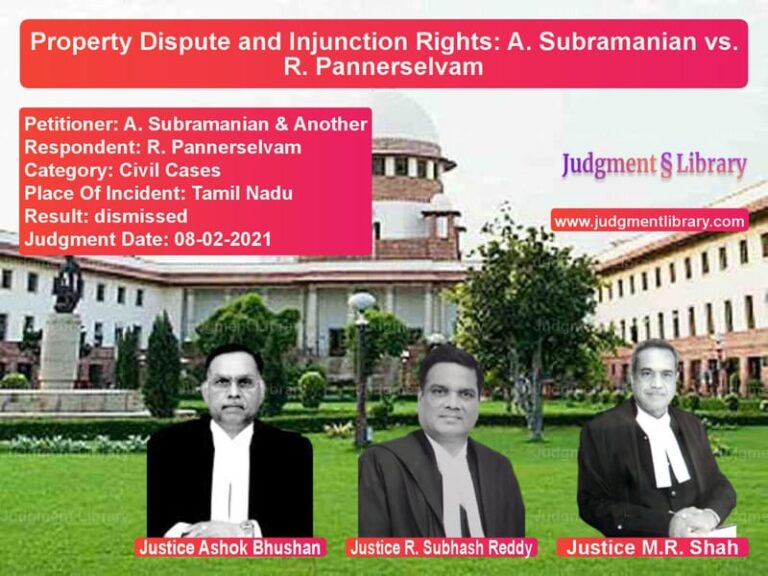Supreme Court Grants Divorce on Grounds of Irretrievable Breakdown of Marriage
The Supreme Court of India, in the case of Gudivada Seshagiri Rao v. Gudivada Ashalatha & Anr., granted divorce on the grounds of irretrievable breakdown of marriage. This judgment provides an important precedent for cases where prolonged separation and continued litigation indicate that the marital bond is beyond repair.
Background of the Case
The case revolved around a marriage solemnized on May 27, 1999, between the appellant, Gudivada Seshagiri Rao, and the respondent, Gudivada Ashalatha. The couple lived together for only four months before separating. Their separation led to a series of legal battles, including maintenance claims and a divorce petition.
The husband alleged that the wife deserted him without justification on November 1, 1999, while the wife contended that she was forcefully evicted from the matrimonial home on October 31, 1999. The prolonged dispute led to multiple litigations over the next two decades.
Legal Proceedings
The husband filed a divorce petition citing desertion and cruelty. However, the trial court rejected the petition, ruling that the husband failed to establish desertion. The High Court, in appeal, found procedural errors in the trial court’s decision:
- The trial court treated the case as one of desertion only and failed to consider cruelty.
- The trial court incorrectly concluded that the marriage was performed under Christian rites, making the Hindu Marriage Act, 1955, inapplicable.
As a result, the High Court remanded the case for reconsideration, allowing the parties to present further evidence.
Maintenance Dispute
Parallel to the divorce proceedings, the wife sought maintenance under Section 125 of the Code of Criminal Procedure (CrPC). Initially, the trial court granted her ₹10,000 per month. The wife appealed for an increase, while the husband challenged the order, arguing that the amount was excessive.
The High Court increased the maintenance to ₹15,000 per month, reasoning that the husband was employed in a public sector undertaking, while the wife, despite being a postgraduate, was unemployed.
Arguments Before the Supreme Court
Petitioner’s Arguments (Husband – Gudivada Seshagiri Rao)
- The prolonged separation and multiple litigations demonstrated that the marriage had irretrievably broken down.
- The trial court failed to consider the ground of cruelty.
- The wife deliberately prolonged the litigation and refused to settle the dispute amicably.
- The financial burden of prolonged maintenance was unjustified, given the wife’s educational qualifications.
Respondent’s Arguments (Wife – Gudivada Ashalatha)
- The divorce petition was based on false allegations.
- The husband was at fault for abandoning the marriage.
- The maintenance awarded was necessary for her sustenance, as she had no independent source of income.
Supreme Court’s Observations and Judgment
The Supreme Court took note of the long-standing acrimony and the lack of any possibility of reconciliation.
Key Observations by the Court:
- “The couple has been separated for over two decades, with no signs of reconciliation. The bitterness has only escalated with time.”
- “There is no scope for the parties to resume cohabitation, and the relationship is emotionally and legally dead.”
- “In cases of irretrievable breakdown of marriage, the court has the power under Article 142 of the Constitution to grant divorce even if one spouse does not consent.”
- “The wife is educated but unemployed. Adequate financial support should be ensured while severing the marital ties.”
Final Ruling
After careful consideration, the Supreme Court:
- Granted divorce on the grounds of irretrievable breakdown of marriage.
- Ordered the husband to pay a one-time settlement of ₹25,00,000 to the wife within six months.
- Directed that the ₹2,00,000 already deposited by the husband before the Supreme Court shall be over and above the ₹25,00,000 settlement.
- Allowed the wife to withdraw the previously deposited amount with accrued interest.
- Ruled that once the full payment is made, all pending civil and criminal proceedings related to the marriage shall be closed.
- Scheduled a compliance hearing in six months to ensure the settlement is honored.
Impact of the Judgment
This ruling is significant for matrimonial law in India, particularly in cases involving prolonged separation:
- Recognition of Irretrievable Breakdown: The judgment reinforces that courts can dissolve marriages that have become unworkable due to irreconcilable differences.
- Financial Protection for the Wife: The Court ensured that the wife is financially secure after divorce, setting a precedent for adequate compensation.
- Judicial Efficiency: The ruling prevents unnecessary prolongation of litigation, bringing closure to both parties.
- Use of Article 142: The Court exercised its constitutional power to ensure “complete justice” by granting divorce despite one party’s opposition.
Conclusion
The Supreme Court’s decision in Gudivada Seshagiri Rao v. Gudivada Ashalatha underscores the judiciary’s evolving approach to matrimonial disputes. By granting divorce on the grounds of irretrievable breakdown and ensuring financial security for the wife, the Court has set a balanced precedent for similar cases in the future.
Petitioner Name: Gudivada Seshagiri Rao.Respondent Name: Gudivada Ashalatha & Anr..Judgment By: Justice B.R. Gavai, Justice K. Vinod Chandran.Place Of Incident: Assam.Judgment Date: 07-02-2025.
Don’t miss out on the full details! Download the complete judgment in PDF format below and gain valuable insights instantly!
Download Judgment: gudivada-seshagiri-r-vs-gudivada-ashalatha-&-supreme-court-of-india-judgment-dated-07-02-2025.pdf
Directly Download Judgment: Directly download this Judgment
See all petitions in Alimony and Maintenance
See all petitions in Divorce by Desertion
See all petitions in Judgment by B R Gavai
See all petitions in Judgment by K. Vinod Chandran
See all petitions in allowed
See all petitions in settled
See all petitions in supreme court of India judgments February 2025
See all petitions in 2025 judgments
See all posts in Divorce Cases Category
See all allowed petitions in Divorce Cases Category
See all Dismissed petitions in Divorce Cases Category
See all partially allowed petitions in Divorce Cases Category







